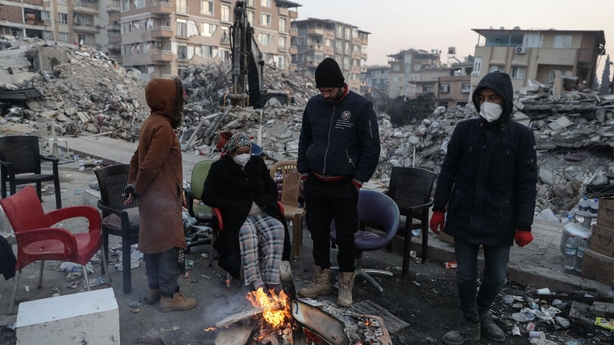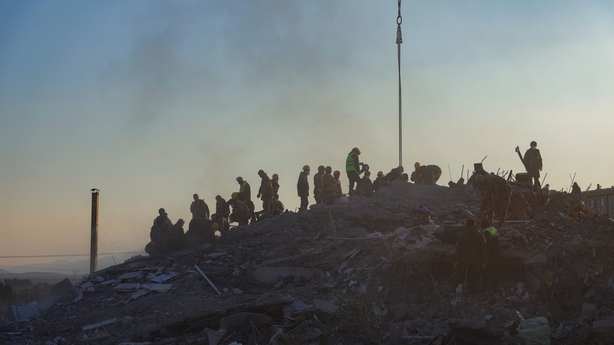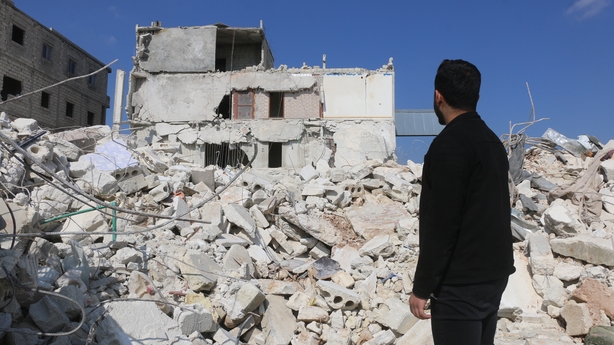UN Secretary-General António Guterres has said that Syrian President Bashar al-Assad has agreed to open two more border crossings to allow in aid to help victims of last week's earthquake.
"Opening these crossing points - along with facilitating humanitarian access, accelerating visa approvals and easing travel between hubs - will allow more aid to go in, faster," said Mr Guterres.
The United States said that new border openings would be a positive if Bashar al-Assad is "serious" about promises made to the United Nations.
"If the regime is serious about this, and if the regime is willing to put those words into action, that would be a good thing for the Syrian people," State Department spokesman Ned Price told reporters.
Earlier, the United Nations said its focus in Syria and Turkey is now shifting to looking after survivors of the earthquakes that struck this day last week.
UN aid chief Martin Griffiths said the rescue phase of the relief operation was coming to a close.

He said the UN would now be placing more emphasis on providing shelter, food, schooling and psychosocial care to the survivors.
The number of people now known to have died in the quakes is more than 37,000.
Rescuers pulled a woman alive from the rubble of a collapsed building in Turkey yesterday morning, a week after the quake struck.
The Turkish death toll now exceeds the 31,643 killed in a quake in 1939, the Disaster and Emergency Management Authority said, making it the worst quake in Turkey's modern history.
The total death toll in Syria has reached 5,714, including those who died in a rebel enclave and government-held areas.
It is the sixth most deadly natural disaster this century, behind the 2005 tremor that killed at least 73,000 in Pakistan.
Turkey said about 80,000 people were in hospital, and more than one million in temporary shelters.
We need your consent to load this rte-player contentWe use rte-player to manage extra content that can set cookies on your device and collect data about your activity. Please review their details and accept them to load the content.Manage Preferences
In Syria, the disaster hit hardest in the rebel-held northwest, leaving homeless yet again many people who had already been displaced several times by a decade-old civil war.
The region has so far received little aid compared with government-held areas.
Earthquake aid from government-held regions into territory controlled by hardline opposition groups has been held up by approval issues with Islamist group Hayat Tahrir al-Sham (HTS) which controls much of the region, a UN spokesperson had said.
Earlier, a HTS source in Idlib said the group would not allow any shipments from government-held areas and that aid would be coming in from Turkey to the north.
Sibel Kaya, 40, was rescued in southern Gaziantep province, some 170 hours after the first of two quakes struck the region, according to a report from broadcaster CNN Turk.
Rescue workers in Kahramanmaras had also made contact with three survivors, believed to be a mother, daughter and baby, in the ruins of a building.
Rescue teams from Russia, Kyrgyzstan and Belarus yesterday pulled a man alive from a collapsed building in Turkey, about 160 hours after the quake struck, Russia's Ministry of Emergency Situations said.
"Rescue work to remove the man from the rubble lasted more than four hours," the ministry said on the Telegram messaging platform, alongside a video showing rescuers taking a man from rubble and carrying him away.
"The work was carried out at night with a risk to life coming from a possible collapse of structures."
In a central district of one of the worst hit cities, Antakya in southern Turkey, business owners emptied their shops to prevent merchandise from being stolen by looters.
Residents and aid workers who came from other cities cited worsening security conditions, with widespread accounts of businesses and collapsed homes being robbed.
Turkish President Tayyip Erdogan has said the government will deal firmly with looters, as he faces questions over his response to the earthquake ahead of an election scheduled for June that is expected to be the toughest of his two decades in power.

A father and daughter, a toddler and a 10-year-old girl were among other survivors pulled yesterday from the ruins of collapsed buildings in Turkey, but such scenes are becoming rare as the number of dead climbed relentlessly.
At a funeral near Reyhanli, veiled women wailed and beat their chests as bodies were unloaded from lorries - some in closed wooden coffins, others in uncovered coffins, and still others just wrapped in blankets.
Some residents sought to retrieve what they could from the destruction.
In Elbistan, epicentre of an aftershock almost as powerful as Monday's initial 7.8 magnitude quake, 32-year-old mobile shop owner Mustafa Bahcivan said he had come into town almost daily since then. Last night, he sifted through rubble searching for any of his phones that might still be intact and sellable.
"This used to be one of the busiest streets. Now it's completely gone," he said.


